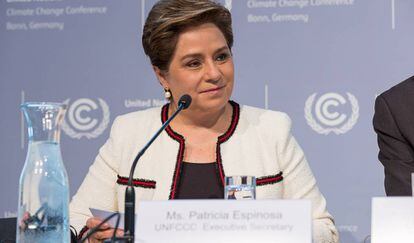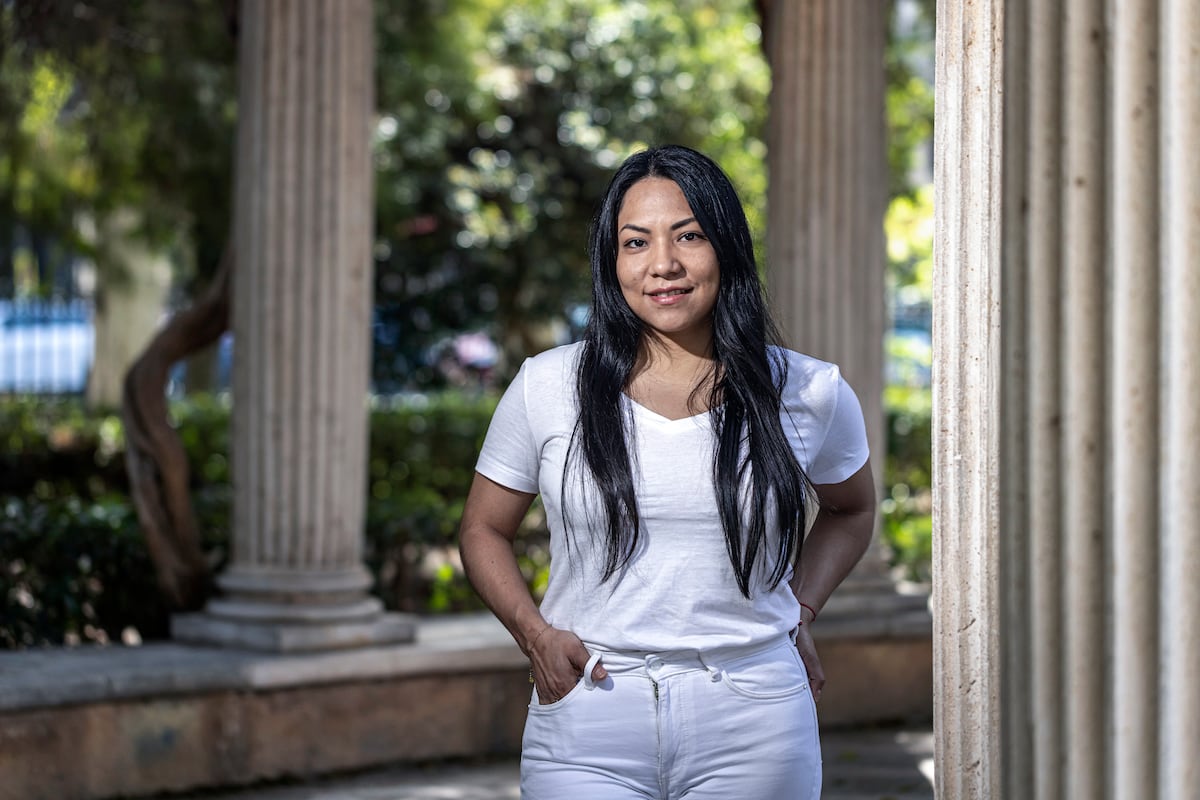Patricia Espinosa, at a press conference in Bonn (Germany), headquarters of the UN framework convention on climate change. UNFCCC
Patricia Espinosa (Mexico City, 63 years old) is hurrying her last days as executive secretary of the United Nations Framework Convention on Climate Change, the treaty that has served as an umbrella for negotiations on global warming for the last 30 years.
On July 15, the six-year term for which this diplomat was appointed in 2016 ends. "The first thing I'm going to do is go to my country to see my mother, which will be her birthday," she says about her immediate future.
After the euphoria over the signing of the Paris Agreement in 2015, a dark time came for multilateralism and the climate fight with Donald Trump in the US presidency, the pandemic and the war in Ukraine.
Ask.
When he began his mandate, in 2016, the Paris Agreement had just been signed.
Are the countries of the world now on track to fulfill that pact?
Response.
We are a long way from meeting the goals of the Paris Agreement.
Although we cannot say that there has been no progress, it has not been to the extent and with the speed with which a commitment to limit warming to 1.5 degrees by the end of this century is required.
We have seen progress in the definition, for example, of the implementation rules of the Paris Agreement, which is something very important and which was the result of a negotiation that lasted six years and that we managed to conclude in Glasgow last year.
Six years to do it is a long time, but it helps to get an idea of the complexity of the issues.
Unfortunately, we are a long way from meeting the reduction in greenhouse gas emissions required to reach the 1.5 degree target.
P.
Science indicates that the current climate plans of all countries, if fulfilled, would lead us to a warming of 2.8 degrees.
What does it mean to reach 2.8?
R.
It really means a catastrophic scenario for the world.
It implies the loss of many species that live on Earth and probably also many human lives, whether due to heat, floods or extreme cold.
Let us remember that climate change is also closely linked to food security and famine.
We are also talking about a world with many more diseases, not only respiratory diseases, which are the most evident due to environmental pollution, but even pandemics.
P.
Is it realistic to think at this time that greenhouse gas emissions will be reduced by 50% in 2030, which is what science marks as a path to meet the goal of 1.5 degrees?
R.
Without a doubt it is very difficult, it is an almost titanic, heroic challenge.
But the truth is that I still think that humanity has managed to overcome many challenges that seemed insurmountable in the past and we have that capacity.
Science also tells us that there is still a small window of opportunity, but a very small one.
What does that mean?
That we have to make decisions that are truly transformative, that truly imply sacrifices for everyone.
We can take the pandemic as an example: there has really been a very clear demonstration of how the world can be radically transformed when it wants to in a really short space of time.
P.
Perhaps there has been a failure in not knowing how to communicate that climate change puts human beings at risk, as happened with the pandemic?
A.
Well yes.
Somehow, we have not been able to get the population in general and decision-makers in particular to see this issue with the sense of urgency that it requires.
I'm sorry because I feel touched.
Every message, every speech or every interview I have, I make that point: we are too far away, we can't afford it, we don't have time.
Anyway, it seems to me that, somehow, this doesn't look like the emergency that it is.
Q.
Is it possible to comply with the Paris Agreement if we remain hooked on fossil fuels?
R.
Well, definitely the energy transition is one of the central pieces to reach this world where we do not exceed 1.5 degrees.
We must understand it as a process that will imply costs, but that also implies enormous opportunities.
And I think we already have some splendid examples of how, in effect, this energy transition has brought benefits that were not even thought of, as is the case of California, which is currently practically operating on the basis of clean and renewable energy.
That is a very large economy, it is not a small community that manages to survive with renewables.
If we had invested massively in renewable energies 10 or 15 years ago, when we already knew that the panorama was catastrophic,
Q.
What effect is the war in Ukraine having on the climate fight?
R.
Well, on the one hand, it is attracting the attention of world leaders.
And with climate change we cannot afford that luxury.
We cannot afford to say: 'Well, then we are going to deal with the issue of war right now and we will see about climate change for later'.
But there is no doubt that today the attention of leaders at the highest level is turning to the issue of war, especially in Europe and the United States.
P.
During your entire mandate you have experienced several events that have had quite a negative influence on the climate struggle.
What do you think he has done more damage: Donald Trump, the pandemic or the war in Ukraine?
R.
They are all from different fields and different nature.
I think that what really harms a process like this the most is the lack of leadership, seeing that there is not a group of countries, small or large, whatever, but a group of countries truly taking the lead and saying here we have to to go.
Actually, we haven't seen it.
And I do not want to minimize the efforts that have been made, for example, within the European Union.
P.
Is the international fight against climate change now better or worse than in July 2016, when you began your mandate?
R.
We have advanced in many ways.
I think it's better.
In other words, the level of awareness and visibility that the issue of climate change has now was not there in 2016. We have seen, for example, an extraordinarily powerful youth movement, which is what has drawn the attention of leaders of the highest level.
In that sense, we are better off.
Now, in terms of the implementation of the Paris Agreement, I think we are still a long way off.
P.
Does it seem that the optimism that was experienced after the signing of the Paris Agreement has dissipated?
R.
Unfortunately, we are seeing a certain crisis of confidence and a deeper division between developed countries or rich countries and developing countries.
And that is why I put the emphasis on the financial issue, on support for developing countries from developed countries.
The goal of mobilizing $100 billion to developing countries was set 13 years ago, and it has yet to be met.
"No one is exempt from suffering considerably as a result of climate change"
Q.
What would you say to a climate change denier to change his mind?
R.
I would tell him, for example, to think about how he wants to be remembered by his grandchildren, his family.
If he wants the people who love him to remember him as someone who, faced with this catastrophic situation, not only kept his arms crossed, but also opposed decisions being made to deal with it.
He would also tell you that no one is exempt from one day suffering considerably as a result of climate change.
You can lose your home, you can lose a loved one... And yet, there are multiple opportunities in this transformation that is required.
P.
And what would you say to a government official or a businessman who does not deny the existence of climate change, but who does not act or delays action in the face of global warming?
R.
What I would tell you is that delaying action or not taking action implies an enormous responsibility for the loss of human lives, for the loss of jobs, for the economic consequences that climate change is going to have on your own society.
And I would remind him that, at the same time, he is missing multiple opportunities to join the world of the future, the better world to which his citizens aspire, the people who have elected him, who are the ones to whom he is accountable.
You can follow CLIMA Y MEDIO AMBIENTE on
and
, or sign up here to receive
our weekly newsletter
50% off
Exclusive content for subscribers
read without limits
subscribe
I'm already a subscriber







/cloudfront-eu-central-1.images.arcpublishing.com/prisa/6YOQKRNM2VFEDJ77EV4BG7TTOQ.JPG)




/cloudfront-eu-central-1.images.arcpublishing.com/prisa/KMEYMJKESBAZBE4MRBAM4TGHIQ.jpg)

